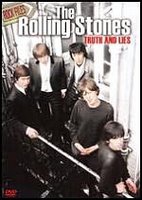
The Rolling Stones: Truth and Lies
Eagle Media
One of the most successful rock bands in history owes its existence to the juke blues of the American South. Named after a Muddy Waters tune, The Rolling Stones have courted controversy since their founding. This comes through clearly in Truth and Lies, a new DVD collecting archival news footage to tell the story of the Stones, as musical, commercial, and journalistic phenomena.
Truth recounts the band’s genesis in of all places a jazz club in Ealing today called the Red Room. They were there to hear Alexis Korner’s Blues Incorporated. Korner is described as: “a guitar player who had been brought up on boogie woogie and played with trad jazz bands. He wasn’t a great musician himself, but he was a great broadcaster and a tremendous kind of champion of the music.” One of the singers who sometimes worked with him was named Mick Jagger.
Their early work was heavily informed by r&b, covering Chuck Berry tunes and touring with the likes of Bo Diddley. The Stones recognized the earthy appeal of those devil blues. As one commentator David Hepworth explains: “Certainly, you were being introduced to this world of extraordinary kind of slick sexual metaphor about “little red roosters” and “down the road a piece” and juke joints and highways, and this kind of dark exotic landscape of the delta and the road up to Chicago. And we [in England] had no geographical reference points for it at all. But Mick Jagger made it sound so attractive.”
As the Stones career progressed, the rock and psychedelic increased, and somewhat at the expense of the blues. The attitude persisted though. Some, Charlie Watts in particular, would return to their blues roots periodically. Of course, as Truth makes clear, the Stones became an industry unto themselves. In fact, one of the more interesting features is the bonus interview with the Stones’ solicitor, Tim Hardacre. According to Goodacre: “altogether they were, I think ideal clients. And even better, they always paid their bills.”
Divorces, management conflicts, and the death of a former band-mate—Truth and Lies has plenty of “Behind the Music” kind of stuff. It is quite something that you can make an interesting documentary about the Stones with only news footage, and no concert film.